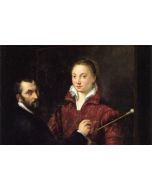Movements in art: Impressionism
This course will be delivered online. See the ‘What is the course about?’ section in course details for more information.

- Course Code: VB613
- Dates: 05/06/24 - 19/06/24
- Time: 10:30 - 12:30
- Taught: Wed, Daytime
- Duration: 3 sessions (over 3 weeks)
- Location: Online
- Tutor: Elizabeth Eyres
Course Code: VB613
Duration: 3 sessions (over 3 weeks)
Please note: We offer a wide variety of financial support to make courses affordable. Just visit our online Help Centre for more information on a range of topics including fees, online learning and FAQs.
What is the course about?
We will explore the innovations and changes in city life that led to the emergence and development of Impressionism and its associated subject matter. These included the growth of the railways, the invention of paint tubes and the growth of new places of entertainment.
In this short, online course we will also investigate the new ways of painting and the innovative subject matter chosen by these artists, and how their works were received by critics and the public. Women Impressionists played a key role in the movement and we will discuss how being female affected the work they produced. We will also consider the work of artists whose work is not considered Impressionist yet are often associated with Impressionism. We will look at the work of Marie Bracquemond, Gustave Caillebotte, Mary Cassatt, Edgar Degas, Eva Gonzalès, Henri Toulouse-Lautrec, Édouard Manet, Claude Monet, Berthe Morisot, Camille Pissarro, Pierre-Auguste Renoir and Alfred Sisley.
This is a live online course. You will need:
- Internet connection. The classes work best with Chrome.
- A computer with microphone and camera is best (e.g. a PC/laptop/iMac/MacBook), or a tablet/iPad/smart phone/iPhone if you don't have a computer.
- Earphones/headphones/speakers.
We will contact you with joining instructions before your course starts.
What will we cover?
• The rise of the Impressionist movement and the key characteristics of the movement
• The methods and techniques used by Impressionist artists
• The work of other contemporaries of the Impressionists.
What will I achieve?
By the end of this course you should be able to...
- Discuss what gave rise to the Impressionist movement
- Name at least four important Impressionist artists
- Identify Impressionist works and describe three key characteristics that allow you to do so.
What level is the course and do I need any particular skills?
This course is suitable for all levels.
You should be able to follow simple written and verbal instructions, demonstrations, hand-outs and health and safety information, and will be invited to take part in group discussion.
How will I be taught, and will there be any work outside the class?
You will be taught with short lectures, slides, and group discussions.
Are there any other costs? Is there anything I need to bring?
You might wish to bring a notebook. You might wish to buy some of the books on any reading list given out in class.
When I've finished, what course can I do next?
Movements in Art: Post Impressionism.
Liz Keevill Eyres worked as a textile designer in the fashion industry for four years and then as a magazine journalist specializing in interior design for 13 years. Her first degree was at Camberwell School of Art which she did at the same time as completing a degree in History and Art History with the Open University. Liz studied and has taught at Kingston University, where she lead modules and lectured in history of art, design history and architecture for ten years and ran study visits both at home and abroad. Liz has researched into English Modernist textile design of the 1950s and the professional practice of the provincial Edwardian architect, in particular Norwich-based architect George Skipper.
Please note: We reserve the right to change our tutors from those advertised. This happens rarely, but if it does, we are unable to refund fees due to this. Our tutors may have different teaching styles; however we guarantee a consistent quality of teaching in all our courses.
